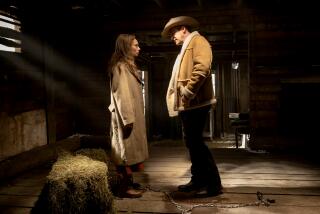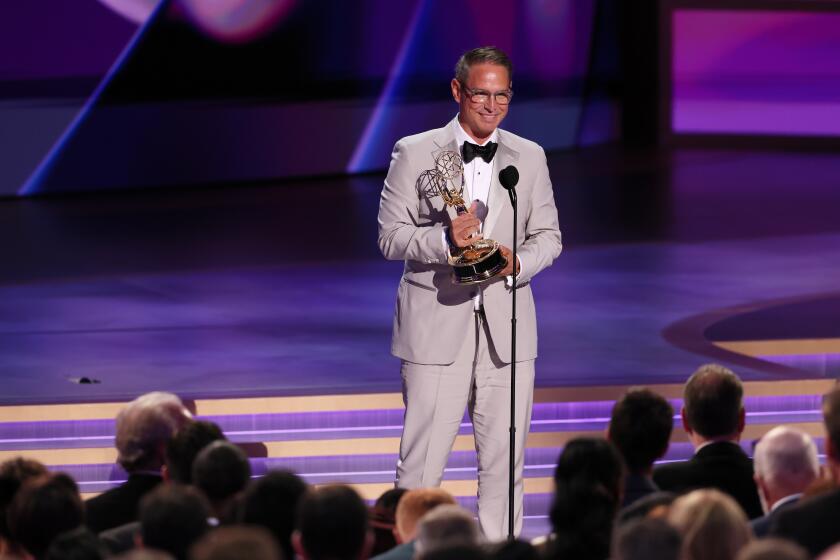TV Movie--Survivor or Casualty in Ratings War?
- Share via
Like premature reports of Mark Twain’s death, recent eulogies on the demise of the made-for-television movie and miniseries have been greatly exaggerated.
In his article “A Death on the Schedule” (Aug. 19), Brian Lowry identifies all the usual suspects: executive dithering, dwindling budgets and the market dominance of the industry’s 800-pound gorilla, Home Box Office.
Lost in the lamentation is the fact that two network films, ABC’s “Life With Judy Garland: Me and My Shadows” and “Anne Frank,” garnered an astonishing 24 nominations for the 2000-01 Emmy Awards. Last year’s best movie winner, “Tuesdays With Morrie,” marked a network comeback in that category after almost a decade. Likewise, the current list of Emmy acting nominees includes a significant number of heavyweights who appeared not on cable but on network television: Judy Davis, Ben Kingsley, Holly Hunter, Brenda Blethyn, Anne Bancroft and others.
From the beginning, made-for-TV films have suffered from a self-imposed inferiority complex. But the label need not be pejorative. Lowry quotes both former HBO chief Robert Cooper and producer Craig Zadan as suggesting that the current so-called crisis should be viewed positively. “I don’t think that’s such a bad strategy for the networks,” says Cooper, “to make fewer movies and make them well.”
Producers like Cooper and Zadan are joined by many creative talents, especially writers, who continue to regard the made-for-TV film as an opportunity to explore characters and themes left unexamined by the metastasizing feature film industry. No medium is better placed to create interesting human stories, and to assure their outreach to the largest audience of any art form.
There is no question that the genre may have temporarily lost its way--and it is incumbent on broadcasters and creators to get it back on track.
To a great extent, the recent decline in the quantity and quality of the made-for-TV movie comes as a direct result of the networks’ relentless--and increasingly obsolescent--pursuit of “sweeps” numbers, the three-times-a-year grouping of “event” programming in November, February and May designed to boost advertising rates. The resulting head-to-head competition, the equivalent of the summer and Christmas season box-office wars, makes it increasingly impossible for any small-screen movie or miniseries to break out, let alone approach the ratings phenomena that were “Roots,” “Shogun” and “The Day After,” to cite three of Lowry’s examples.
Recent retrenchment by the networks will undoubtedly affect production. It is unfair, however, to blame the audience, which, one high-placed network executive recently alleged, is simply no longer willing to commit two hours to a single block of programming. The fact is, viewers do that almost every night, whether that block is divided into sitcom-and-drama packages (“Will & Grace” and “Just Shoot Me” followed by “ER”; “60 Minutes” leading in to “Touched by an Angel”) or devoted to a single program. Nor is it any longer fair to say, as Lowry’s article (like so much ink expended on this topic) does, that “risk-taking” has become the exclusive province of HBO and the other pay-cable networks.
Among broadcast networks, ABC clearly leads in its willingness to take on more challenging fare--as its Emmy nominations in the miniseries category demonstrate. In airing “Anne Frank,” the network made the difficult decision to broadcast the movie’s wrenching last hour, with its scenes of concentration camp life, commercial-free, allowing the filmmakers a significantly expanded running time. The decision, with all its concomitant financial hazards, paid a certain dividend, resulting in the only miniseries this year to actually build on its opening-night numbers, despite heavy competition from competing series programming.
“Event” movies and miniseries, most agree, point the way forward. This can often mean “events” of the Robert Halmi Sr. brand: lavish, effects-laden films such as “Merlin,” “Noah’s Ark,” “Arabian Nights” and, most notoriously, “The Tenth Kingdom,” that are prohibitively expensive and not always guaranteed ratings-grabbers.
But “event” need not mean epic. HBO, after all, came to the forefront largely on the basis of programming that became an “event” simply for its daring to undertake controversial subject matters that were once the province of the best network films (think “The Execution of Private Slovik,” “That Certain Summer” or “Special Bulletin”).
Susan Lyne, executive vice president of motion pictures for TV and miniseries at ABC, puts it this way to her creative teams: “We don’t make ‘TV movies.’ We make feature films that air on television.” The distinction is important: For made-for-network fare to survive, its proponents at the network (and there are still a few) and its creators must think--quite literally--”outside the box.”
Seen in this light, this year’s Emmy nominations are an indication of what the future holds--and what it doesn’t. As Alliance Atlantis executive vice president Ed Gernon told the New York Times in May, “The point is to make movies now that you can’t [usually] see on television.”
That’s not a bad thing.
More to Read
The complete guide to home viewing
Get Screen Gab for everything about the TV shows and streaming movies everyone’s talking about.
You may occasionally receive promotional content from the Los Angeles Times.






